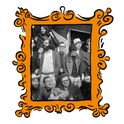Last week's New Yorker (March 3) contains a very moving piece by Honor Moore, daughter of Paul Moore, the former bishop of New York. It is entitled, 'The Bishop's Daughter' and subtitled 'A father, a faith, and a secret.' The 'secret', you will not be surprised to hear, is that he was apparently gay and, unknown to his family, had a long, secret (and it seems very happy) gay affair.
All parents, of course, are a mystery to their children. This is at the heart of a series of beautifully written memoirs in recent years, among them Louise Kehoe's book about her father, the architect Lubetkin (In This Dark House), Lisa Appignanesi's Losing the Dead, Blake Morrison's, And When Did You Last See Your Father? and much of Alan Bennett's recent writing. The best of these books look at one or both parents as a kind of detective story to be solved, full of tantalising clues. This is certainly true of Moore's article about her father.
There is more to be said about the popularity of this genre today and what it tells us about our culture, something about the way parenting has changed and how even middle-aged writers continue to think of themselves, essentially, as young and childlike. But what is disappointing about Moore's piece and the way it is sold by the New Yorker is the sad predictability of the 'secret'. The 'secret' is not that his longtime affair seemed such a happy one, but that he was gay in the first place and how much importance is ascribed to this. Moore, as many readers in Britain will not know, was an important figure in New York life in the 1970s and '80s. He was a passionate and eloquent champion of the poor and the dispossessed, as a bishop should be. Together with William Sloane Coffin at nearby Riverside Church, he made the Episcopalian Church in New York a beacon of sanity in hard times, attacking American support for torture and the violation of human rights in Central and South America, the poverty that followed the decline of the industrial northeast, the sad culture of drugs and violence and the AIDS epidemic that had such a huge impact on New York in the 1980s. All of this was admirable and not easy in the New York of mayor Ed Koch and the United States of Ronald Reagan. And it hardly gets much of a mention in his daughter's piece as if a distinguished war record (purple heart and other medals for bravery) and his exemplary work as a bishop for peace and justice is somehow outweighed by the 'secret' of his private life.
There are many signs of the way our culture is changing. One is the shift in interest from a man's public life and achievements to a growing preoccupation with his private life and sexuality. Honor Moore's piece is far away, in its seriousness and decency, from the nonsense about Diana's lovers, the tabloids' fascination with the newest generation of Royals and the endless celebrity chat that fills magazines and newspapers that like to call themselves serious. And yet, it is still a part of that world, part of the rush to read the diaries, hear the gossip and see the sheets.
The Bishop and the 'secret'
March 06, 2008












